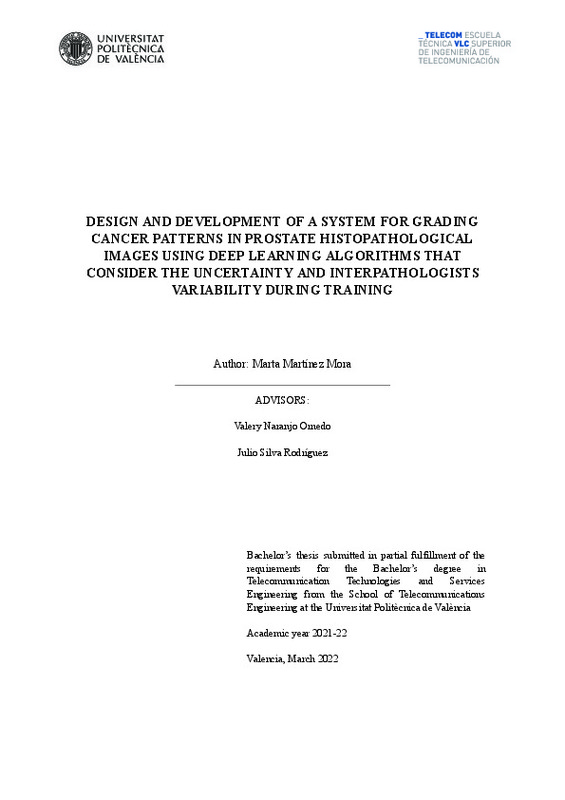

Diseño y desarrollo de un sistema de gradación de patrones cancerosos en imágenes histopatológicas de próstata utilizando algoritmos de deep learning que tengan en cuenta la incertidumbre y variabilidad inter-patólogo durante el entrenamiento
RiuNet: Repositorio Institucional de la Universidad Politécnica de Valencia
JavaScript is disabled for your browser. Some features of this site may not work without it.
Buscar en RiuNet
Listar
Mi cuenta
Estadísticas
Ayuda RiuNet
Admin. UPV
Diseño y desarrollo de un sistema de gradación de patrones cancerosos en imágenes histopatológicas de próstata utilizando algoritmos de deep learning que tengan en cuenta la incertidumbre y variabilidad inter-patólogo durante el entrenamiento
Mostrar el registro completo del ítem
Martínez Mora, M. (2022). Diseño y desarrollo de un sistema de gradación de patrones cancerosos en imágenes histopatológicas de próstata utilizando algoritmos de deep learning que tengan en cuenta la incertidumbre y variabilidad inter-patólogo durante el entrenamiento. Universitat Politècnica de València. http://hdl.handle.net/10251/181899
Por favor, use este identificador para citar o enlazar este ítem: http://hdl.handle.net/10251/181899
Ficheros en el ítem
Metadatos del ítem
| Título: | Diseño y desarrollo de un sistema de gradación de patrones cancerosos en imágenes histopatológicas de próstata utilizando algoritmos de deep learning que tengan en cuenta la incertidumbre y variabilidad inter-patólogo durante el entrenamiento | |||
| Autor: | Martínez Mora, Marta | |||
| Director(es): | ||||
| Entidad UPV: |
|
|||
| Fecha acto/lectura: |
|
|||
| Resumen: |
[ES] El cáncer de próstata es a nivel mundial el segundo tipo de cáncer con mayor prevalencia. En 2018 se diagnosticaron 1.3 millones de pacientes y se estima que el número de casos anuales nuevos aumente en un 40.2% en ...[+]
[EN] Prostate cancer is the second most prevalent type of cancer worldwide. In 2018, 1.3 million patients
were diagnosed and it is estimated that the number of new annual cases will increase by 40.2% in
2030. This pathology ...[+]
|
|||
| Palabras clave: |
|
|||
| Derechos de uso: | Reconocimiento - No comercial - Sin obra derivada (by-nc-nd) | |||
| Editorial: |
|
|||
| Titulación: |
|
|||
| Tipo: |
|
recommendations
Este ítem aparece en la(s) siguiente(s) colección(ones)
-
ETSIT - Trabajos académicos [2410]
Escuela Técnica Superior de Ingenieros de Telecomunicación






